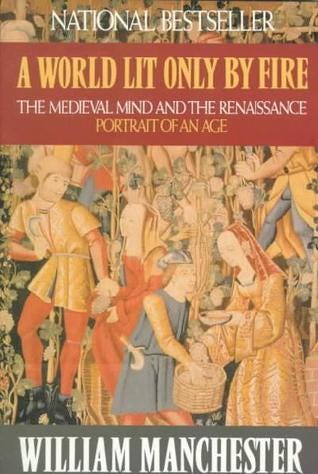Medievalists HATE Him: What Is Your Field's "A World Lit Only By Fire"?
You may have encountered William Manchester’s A World Lit Only By Fire: The Medieval Mind and the Renaissance in a high-school reading list (I have a dim memory of finding it under the ‘Suggested Reading’ section of a European history syllabus myself) or any number of pop-history endcaps in a Waterstones or Barnes and Noble over the last 30 years.
It blends together, for me, with some of the mythopoetic bestsellers of the late 80s and early 90s, your Iron Johns and Women Who Run With The Wolves – surprisingly pleasurable nonsense cobbled together by someone whose credentials at least suggested they ought to have known better, and devoured hungrily by a grateful nation. Manchester was a journalist who came up under the mentorship of H.L. Mencken, and by all accounts his popular biographies of Churchill and Kennedy were fairly well-received, so I have no idea what moved him to suddenly attempt a brief history of the entire Middle Ages, but it’s the most prominent example of a type of book that fascinates me: The amateur/popular history of an entire field that’s largely beloved (or at least successful) outside of said field and widely loathed within it. Of course pop histories are not written with academics or specialists first in mind. I don’t mean to suggest that any book written for a general audience would necessarily or automatically inflame subject-matter experts; some generalities, elisions, collapses, differences in goals, etc, are to be expected. The necessary elements for this type of book, I think, are unexpected or outsized success (say, making the bestseller list, or becoming a staple of high-school syllabi), a consensus of hostility within the field, and the repetition or introduction of high-profile myths about the field to the general public.
Here’s Jeremy Adams of Southern Methodist University reviewing World for the Medieval Academy of America’s journal Speculum in 1995:
“This is an infuriating book. The present reviewer hoped it would simply fade away…Unfortunately, it has not: one keeps meeting well-intentioned, perfectly intelligent people (including some colleagues in other disciplines — especially the sciences) who have just read this book and want to discuss why anyone would ever become a medievalist…Historians of the migration period may find it annoying to read that the Magyars arrived (apparently) in the fifth century.”
I will say this for Manchester, there’s something of the pleasure known as the hater’s delight to be found in a book so fundamentally contemptuous of its subject. He refers to the Middle Ages as an era of “almost impenetrable mindlessness” and makes increasingly outrageous claims, like that medieval people had no sense of time (!), that the Pied Piper was a real person (!) who lived in Hammel (!!) and killed 130 children on June 24, 1484 (!!!!), and that soldiers who throw themselves on live grenades to save their comrades are behaving “impulsive[ly]” and are “actually unheroic,” which is an astonishingly confident assertion. This might be the most necessary condition of all, aside from popularity — where specialists might be reluctant to make broad claims about states of mind, particularly in the absence of substantial evidence, Manchester-types confidently announce that anyone who has ever leapt over a grenade has done so purely out of instinct, and by the way instinct is fundamentally, even essentially, anti-heroic, before marching on to the next claim.
I asked Grace and Alex, two of the nearest Victorianists to hand, what their field’s A World Lit Only By Fire might be, but the only candidate was a tentative one: “Maybe [Peter] Ackroyd’s Dickens biography? Everyone (rightly) loves Hobsbawm.” But Peter Ackroyd strikes me as the control group against which Manchesters can be tested — his popular histories are so frequent that it’s difficult to imagine anyone getting truly worked up over them. He is to popular histories what Stephen King is to horror: an absolutely relentless dominator of the genre, and this very inescapability renders them mostly harmless. In 2005 alone he published Shakespeare: The Biography, Ancient Greece, and Ancient Rome. It’s reflexive with him, like a dog scratching the back of its own head. I’ve never met a Victorianist irritated with Peter Ackroyd. I think there must be better candidates, so I’m taking the opportunity to canvass while I continue to convalesce and can’t do much besides sit on the couch and wait for the good TV shows to come on.
So I put it to you: What is your field, and who is your William Manchester?
[Image via Goodreads]



This is an emotional reaction: there's a weird (to me) argument that pops up in arguments about late antiquity about if it "felt like" the Western empire fell. And like... there's a lot of nuance in thin slices of time/space/level of society/etc., but people know when they've lost access to trade networks and physical security their grandparents enjoyed, right?
In olden days a pot of garum
Wasn't so harum-scarum
But Jesu knows
Now anything goes
In olden days the Rhine frontier
Kept Germans from getting nearer
But then it froze
Now anything goes
I am an air traffic controller, and there are no popular written works about my profession. But if I could eradicate Pushing Tin and Airplane from the movie universe, I would.